Man on a mission
He’s the man who is marketing our potential future prime minister. But Havas’ David Jones has many missions, as Louise Jack finds out
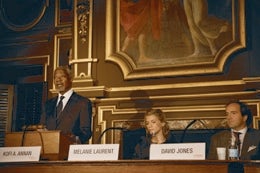
His energy levels hardly need topping up, yet David Jones, Havas Worldwide global chief executive, fairly fizzes with enthusiasm when talking about his company’s current project – David Cameron’s bid for power in the forthcoming general election.
Havas Worldwide agency Euro RSCG London handles the Conservative Party’s advertising account, with Jones at the helm. He reveals: “For me, political marketing is the single most exciting thing you can do in our business. It just moves at a speed and velocity that is like nothing else.”
It’s not as if Jones’ life appears to lack excitement or success. Not unlike Cameron’s rapid rise through the political ranks, Jones rose to become global CEO of Euro RSCG at the tender age of 38. Last year, he also added the title of global chief executive officer of Havas Worldwide, the group’s holding company.
Jones’ passion for politics may seem slightly incongruous with what seems like a charmed international life. Married to wife Karine with three small children, he hangs out with film and sports stars, such as tennis ace Yannick Noah and French Oscar-winner Marion Cotillard.
But when you realise that he does business with the likes of Kofi Annan and Bob Geldof, Jones’ interest in politics starts making sense. He believes that the creative industry has an obligation to use its power to “do good” and the work for the Conservatives is just one thing that falls under this umbrella.
Like many admen who take on political clients, Jones is a believer. “This is really important to me. Cameron genuinely is a great guy. The more I’ve got to know him over the past two years the more I think: ‘Our country needs somebody like him who can come in and sort the mess out’.”
The pre-election campaigning began in earnest barely after the new year began. A poster campaign appeared in targeted areas of the UK, featuring a giant image of Cameron and the copy: “We can’t go on like this. I’ll cut the deficit, not the NHS”. Some observers claim the poster has backfired somewhat; Cameron’s airbrushed image has sparked an internet craze with spoofs of the poster appearing on websites and viral emails.
While he can’t have been overjoyed, it is unlikely that Jones will have been surprised by these developments. He is acutely aware that in political marketing, as with all sectors of marketing, the internet has changed everything.
He explains: “The biggest fundamental difference between this and the last election in Great Britain, and it was demonstrated in the US election, is just how important social media is today, compared to how it was previously.
“We’ve done a lot of work looking at who has done things well and we’ve also looked at the US elections to see what we can learn from there. I think the use of social media is going to be really exciting and interesting,” he says and smiles: “I’m looking forward to that game.”
The political game began for Euro RSCG two and a half years ago when the agency won the Tory account at a time when Cameron’s star looked a lot less bright than it does today. At that time, several agencies declined to pitch for the business, despite the fact that the Conservatives (unlike Labour) pays a fee to its ad agencies.
But Jones and his colleagues Chris Pinnington, Euro RSCG Worldwide chief operating officer, and Kate Robertson, Euro RSCG Worldwide UK group chairman, were keen from the start.
Pinnington explains: “We’d all grown up in the Saatchi era,” referring to the iconic work Saatchi & Saatchi did for the Conservatives during the 1979 election campaign, including the still-talked-about poster “Labour Isn’t Working”. Pinnington adds: “I think that everyone in advertising at that time wanted to get involved in a political campaign because of that work.”
It is Pinnington who is running the Tory business on a day-to-day basis, largely because he is based in London and can attend to its daily needs. He says: “The only thing you have to balance is to ensure that it doesn’t take over the agency.” Meanwhile, Jones takes care of what he calls “the bigger picture”.
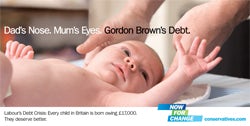
The pair are extremely circumspect in what they will say about the work or strategy on the Conservative’s business. They are fearful that any comment will be taken out of context and be blown out of all proportion in the run-up to the election, so they opt to say as little as possible specifically about the campaign.
But Jones cannot mask his enthusiasm for political advertising as a discipline. He explains: “The reality behind what political advertising needs to do depends on the social context; it may be stating the obvious, but it would be dramatically different if you were sitting in a booming economy to if you were in a bust economy. It also makes a difference if you’re the ‘new person’ versus the incumbent.”
And although it might be eye-catching and heavily debated, does political advertising have a real impact on the way people vote? Some recent Weber Shandwick research suggests that it does not.
Jones responds: “I think the best advertising, and communications in general, works at the fringes. There are people that are going to vote a certain way, no matter what you say. There are people who are going to vote for you, whatever you do. And then there are the people in the middle who are undecided. Where communication works is in the middle.”
He muses: “I think hard powerful facts resonate in today’s world. The great political advertising in the UK has had a certain wit to it.”
Many commentators predict an Obama-style political campaign in the UK with plenty of social media action. Digital was central to Obama’s campaign and while his numbers of Facebook friends may have caught media attention, this was backed up by multiple layers of online work, including carefully targeted and personalised emails to key voters.
Jones is the first to acknowledge, however, that there are major differences between the UK and the US. “There are a lot of things that are very different. The length of time for one; US elections are marathons, and UK ones are sprints. In the UK, the power and role of the press is much more important, he says.
“My personal view is the US voters tend to vote ‘for’ things where as UK voters tend to vote more ‘against’ things. But at its most simplistic, the key message from the US campaign is that a strong leader with a clear message will win.” Which is as close to discussing Cameron’s strategy as Jones is likely to come before the polls.
Jones is not alone, however, in steering Cameron in his approach to marketing. The Tories have former News of the World editor Andy Coulson as director of communications and planning, Anna-Maren Ashford as marketing director and Steve Hilton, author of Good Business, as director of strategy. Risha Saha heads up the new media operations, and digital agency LBi was appointed in September to provide the party with a range of services including tools that will help supporters campaign and raise money.
With so many helping out on Cameron’s marketing, any election victory may see multiple internal and external people claiming the glory. Jones, however, says he is not disappointed that, so far, Euro RSCG’s involvement has received limited publicity.
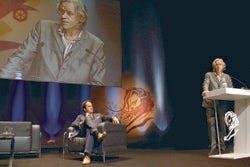
“Clearly, if you are part of a team that helps to get a prime minister or president elected, it is very good for the reputation of the agency but there’s no point in making a lot of noise before the event. The key thing is that you deliver for the client rather than tell everyone that you’re going to.”
His colleague Pinnington concurs: “It is inconceivable that our name won’t be associated with it in the long term, so I’m not concerned.” He adds: “I’m not that keen to be massively high-profile and risk journalists raking through the dustbins. Hopefully we produce work that everyone talks about positively and that gets him into power.”
The task of helping getting Cameron into power is just one of numerous missions that Jones has ahead of him. Currently on his agenda – alongside running his global advertising network with 15,000 employees – are the One Young World project and the recent Tck Tck Tck initiative (see One Young World and Tck Tck Tck, below).
It must be difficult to balance these projects with client work for global accounts such as Reckitt Benckiser, but Jones seems unfazed.
It doesn’t even seem clear if or when he actually sleeps as he frequently hops from one time zone to another.
Pinnington, who works closely with him says: “He is a full-on enthusiast,” and adds, not unkindly: “He is just one of those constantly ‘up’, annoying kinds of people.”
One of the reasons Jones may cope so well with this pressured lifestyle is that while he is urbane and charming in person, with a frenetic mind that leaps to a new thought before the previous one is completely articulated, he is also deeply competitive.
This streak, once expressed in his youth when he toyed with a professional tennis career, has found its outlet in new business pitches. Jones admits: “I’m massively disappointed every time we lose a pitch. We can win ten and lose one. The one we lose will annoy and bug me for months.”
At 43, this tremendous drive and focus has rewarded Jones with a life far removed from his childhood home in Goostrey, a small village in Cheshire. After a fairly straightforward and classic beginning in advertising, Jones really hit his stride at Abbott Mead Vickers BBDO, where he was appointed its youngest board account director. AMV BBDO chairman Cilla Snowball says she is “completely unsurprised” that Jones has reached his current position.
Jones left AMV BBDO to join Euro RSCG, first to run its Australian operation, which he restructured to incorporate an internal digital agency and “we just went zoom”, he says. The agency doubled in size (from $10m to $20m in revenue) and trebled the profits in four years. Little wonder that Havas chairman Vincent Bolloré quickly made it his mission to promote Jones.
The business model he created in Australia is one that, as group CEO, Jones is putting in place throughout the Euro RSCG network. He aims to reinvigorate the Euro RSCG Group as a “creative powerhouse” and he can claim some progress in this respect with some new business wins, including Heineken in the US and Dulux globally.
Jones himself is more concerned that his speedy rise to the top of his business means he has a responsibility to pass on what he sees as his “luck” in life. He puts his drive to get involved with massive social and political issues through Tck Tck Tck and One Young World down to this.
He explains: “I have been outrageously lucky. Almost everything I have ever done in my career has come off. I have an amazing wife, three unbelievable children and, touch wood, I have never had a serious issue or problem in my life.”
“Sometimes I think either all that has happened so that I am in the position that I can do this stuff, either that or it is the guilt factor and I feel that because all this has happened for me, I should do it.”
Having ended up in his position, he thinks that he should use his skills to improve life where he can. He adds: “Our industry has amazing power to change people’s behaviour and I believe that we not only have an opportunity, but an obligation, to use it to change people’s behaviour around some of the big issues facing the planet.”
Of course this strategy may not be entirely altruistic. Apart from wanting to do good, Jones’ drive to use marketing and advertising to change the world also makes good business sense for Euro RSCG (see opposite).
Jones also hopes that doing something worthwhile creatively will be what attracts the next generation of talent to work in advertising. The growth in digital also makes it attractive to people who might not have considered traditional advertising before, he thinks.
He says: “I think we as an industry turned into the ‘30-second-television-commercial’ industry. What is brilliant about the digital revolution is we’ve opened ourselves up to a whole bunch of talent who, ten years ago, might have said: ‘I don’t want to work in advertising and make TV commercials’.”
Bringing on board new minds who can go beyond traditional marketing thinking, may help decide which agencies are most likely to succeed in the next decade. As Jones puts it: “What this does is put the agencies who understand this world back in a position where they can be really invaluable to their clients.”
So where does this human dynamo see himself in ten years’ time? Should Cameron succeed, a knighthood or peerage does not seem out of the question. But he says: “In terms of work I see myself still doing the same or I will have launched my own agency focusing 100% in socially responsible business and creativity.”
Again, however, Jones comes back to the bigger picture in the end. “In terms of life, however, making sure I am a good dad is priority number one.” After all, he adds: “I love my job, but it is only that.”
CV
Born: 9 November 1966
1985 – 1987 Reutlingen Fachhochshule, Germany. Jones studies on the first European Union-sponsored business programme.
1987 – 1989 Middlesex Business School. Gains BA Hons (2:1) in European Business Administration.
1989 – 1991 BDH Manchester (now TBWA). Account executive, senior account manager on Henkel, Silentnight and Savlon.
1991 – 1994 JWT Europe. Based in Paris. European account manager and director on Unilever.
1994 Lowe Europe; European account director on Braun.
1994 – 1998 Abbott Mead Vickers BBDO. Account director (promoted to youngest board account director) on BT, Famous Grouse, Pizza Hut, Mars and Wrangler.
1998 – 2002 Euro RSCG Australia. Chief executive officer (appointed aged 32).
2002 – 2004 Euro RSCG Worldwide. President of global brands and global brand director on Reckitt Benckiser.
2004 – 2005 Euro RSCG New York. Chief executive officer.
2005 – present Euro RSCG Worldwide global CEO, and director-general of Havas.
2009 – present Havas Worldwide. Global chief executive officer.
Fluent in French, German and English.
Wife Karine and children, Alphonse (6) Agathe (4) and Auguste (1)
Tck Tck Tck

In summer 2009, David Jones joined forces with Kofi Annan, former secretary general of the UN and president of the Global Humanitarian Forum, to launch a campaign aimed at galvanizing the public and world leaders ahead of the UN Climate Change Conference in Copenhagen last December.
Jones and Havas created the Tck Tck Tck campaign, part of which became a kind of global musical petition, intended to raise awareness about climate change.
Jones explains: “I was contacted by Herve de Clerck, who runs ACT Responsible [a non-profit organisation whose aim is to show the positive role of advertising in social and environmental issues] and he told me that Kofi Annan was looking for an agency. He asked whether I might be interested, so I went to Geneva to meet Kofi.
“What I wanted to do was create a campaign that was open-source. There are so many great initiatives out there and what normally happens is there are 15 different campaigns about one issue, so what we wanted to do was create a movement. We wanted to put something out there that the world takes over – it’s not ours.”
He adds: “We put the Tck Tck Tck ‘Deadline Copenhagen’ assets out there and told people: ‘Take this and use it. If you’re an advertiser, use it’. That goes against all the rules of advertising, which are normally about command and control.”
The campaign was revealed at the Cannes Advertising Festival amid great fanfare and was backed by Bob Geldof, Desmond Tutu and many other luminaries. Jones is proud of this work, not least because it had no funding but also because more than 15 million people signed up as “Climate Allies”.
Despite this demonstration of how climate change can motivate millions of people, Jones is still upset that the much-anticipated Copenhagen Summit on climate change last December failed to achieve many of its aims. Despite the support for Tck Tck Tck, he lists this as one of his “biggest disappointments”.
One Young World
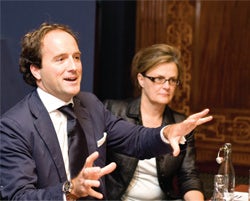
One Young World is an initiative which aims to bring together a group of young potential leaders of tomorrow. At its inaugural event in London on 8-10 February, 1,500 young people from 192 countries will meet for a global summit to debate the biggest challenges facing the planet.
The project is being supported by “counsellors” including Kofi Annan, Archbishop Desmond Tutu, Bob Geldof, former head of BP Lord Browne, supernetworker Carole Stone and activist Oscar Morales among others. Counsellors will chair and guide the discussions and each debate will culminate in a “resolution” being drawn up.
Founded by David Jones and Euro RSCG Worldwide UK Group chairman Kate Robertson, a selection process for delegates has taken place online and attendance fees of €3,000 (£2,600) are being sponsored by a variety of companies including American Express, Starbucks, Hewlett Packard, Samsung, Air Asia, Allianz, Total, KPMG and Burberry.
Jones explains: “Kate Robertson came up with the idea and I thought if we blew it up on a massive global scale then we could do something really powerful.
“The premise is that if the world’s leaders cannot make the right decisions, then maybe the young people of the world can help them make the right ones – or even force leaders to make the right decisions.”
He continues: “I think there is a dramatic difference between this generation and any before. There is more in common with the schooling I had and the education someone had 500 years ago, than there is with my schooling and the education that someone aged ten years old is having now.”
This, he thinks, is down to digital technology. Jones says that being online gives young people access to unlimited amounts of information. While education used to require teaching to impart knowledge, now people can access it from anywhere.
But what about the high fee that One Young World attendees must pay to come along and be involved in the debate? Doesn’t this mean that less well-off youngsters will be excluded?
Jones says not: “We tried to make it simple and make everyone the same, the same price for everyone. We’re aware €3,000 is a lot, and that there are countries where it is a hell of a lot of money. So when we get companies that say they’d like to sponsor 20 delegates, we’re linking them up with people and the first places that are getting the money are a lot of the poorer countries.”
But with corporate sponsorship comes the risk of businesses attempting to steer the issues discussed at the summit. Jones says he has no concerns on this score.
“I don’t see a conflict with companies getting involved because the ability of any one company to control the agenda is impossible. It is as without-an-agenda as you could possibly get.”
With Jones’ belief that digital access is fuelling the ambitions of the next generation of global leaders, some might ask why a physical meeting in London is necessary. Surely a virtual meeting would be reasonable and would cut down on the high attendance fees?
“The reason we need a physical event is you need a central point; a nucleus,” says Jones. “I still think that things which are both real and virtual work much better than if they are just digital or just physical.”
Jones also has his eye on the potential media exposure that the London event will offer his cause. “In order for this to cut through and have impact, the fact you have all these people with Kofi, Bob [Geldof] and so on coming together in London, will make it an event that people will listen to and get involved in.”
The measure of success of One Young World for Jones will be whether the young delegates go on to run countries, non-governmental organisations or major businesses in the future.
He also hopes the ideas from the meeting will endure over time, and says his ideal glimpse of the future involves seeing the ideas from One Young World going on to “change and shape the policies in the world, shape issues in the world or even become the resolutions that are then adopted by other people”.
Jones on why ‘good’ business makes sense
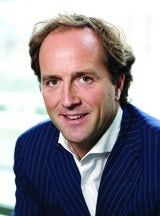
What is fantastic about the economic meltdown is that it has shown the world that the pursuit of profit for profit alone leads to a bad place. I think it was a wake-up call.
Socially responsible business is the way to go about things. The meltdown will accelerate that and I think things have already changed dramatically. I only have to look at my clients to see everyone has picked up the same research and understands that today’s consumers want to deal with businesses that stand for more than just profit.
The fundamental point is that consumers want it. If you look at the most successful businesses of today, they are the ones who are pioneering socially responsible business. For example, Toyota was the first car manufacturer to get into environmental concerns. It’s been the most successful car company in the past decade.
Wal-Mart was once seen in a really poor light and is now probably the number one in terms of movement towards sustainability. Its reputation is completely transformed. If you look at the chief executives who are doing well in their categories, they are all saying the same thing: “It’s not just about saving the planet, it’s about saving money and saving the planet”.
Everyone gets the fact they need to be addressing this. The question is: how? The ones that do it well put it at the heart of their business strategy. That’s what we’ve done with [Jones’ youth movement] One Young World. We looked at what we are good at and what we can do. I don’t run a country, but what I can do is harness the power of our network.
Although [environmental campaign] Tck Tck Tck was pro bono and One Young World will lose money in year one, they are clearly a benefit to our business. Clients and potential clients will look at us and think: “We need to understand how we navigate our brand and our business in the world as it is today, and these people seem to have an idea how to go about it”.
Clients understand they need to move into this space and they can see we are already there.




